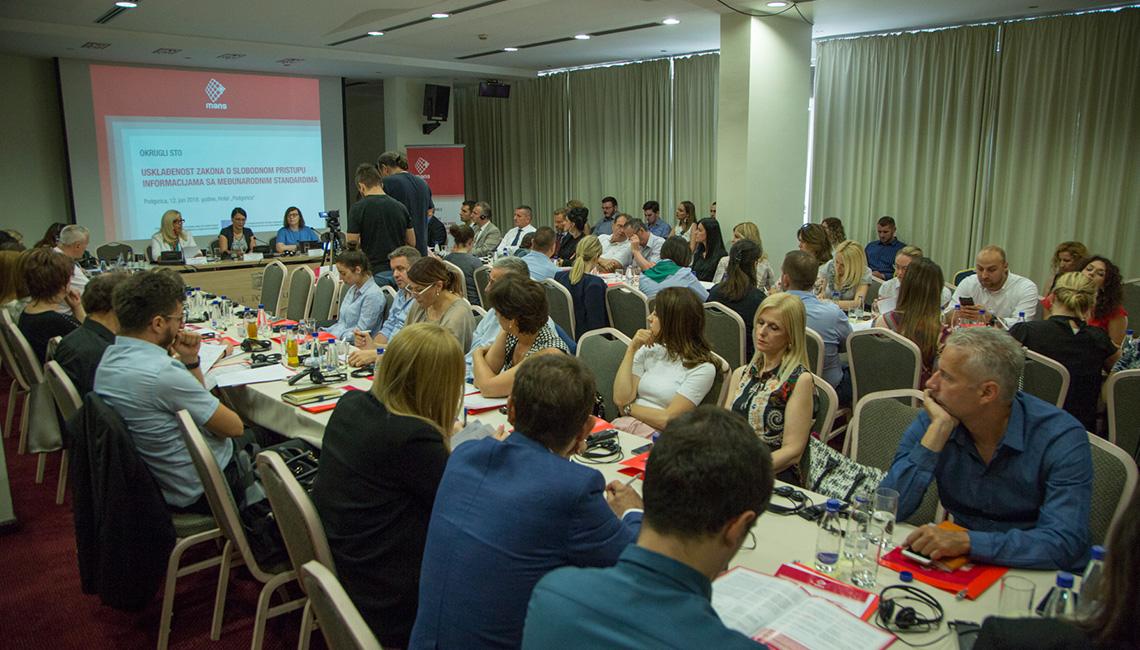
PODGORICA 13.06.2018. – The Free Access to Information Law has to be amended in order to comply with international standards, said Executive Director of Access Info Europe Helen Darbishire , stating that the law must apply to all information, and that the exceptions must be limited.
At the round table “Compliance of the Law on Free Access to Information with International Standards”, organized by the Network for the Promotion of the Non-Governmental Sector (MANS), Darbishire said that the Montenegrin Law is largely in line with international standards, but that, as she pointed out, certain shortcomings have to be improved.
“We need to focus on the negative aspects of the Law, which primarily refers to Article 1 of the Law, which contains a series of exclusions, which are unacceptable and in violation of international standards and the Constitution of Montenegro, and have a negative effect on practice. It is not acceptable that the first article of the Law on Free Access to Information prescribes that the right to access and use will be in accordance with this Law. Article 1 is also contradictory because it states that certain laws do not apply to this law, but other norms, “Darbishira said.
She assessed that this phenomenon is worrying and that it is contrary to the established practices of the European Court of Human Rights.
“The Law on Free Access to Information has to be amended to link with international standards, as well as with the Montenegrin Constitution. Exceptions must be limited, and they must be in line with those exceptions laid down in the European Convention, “Darbishira said.
Executive Director of NGO MANS, Vanja Ćalović Marković, said that since 2005, when it was adopted, the Law on Free Access to Information is “one of the biggest gifts in the fight against corruption and spill types of abuse”.
“The law is like an oxygen for the fight against corruption and we have managed to discover and prevent many cases of corruption. Unfortunately, many corrupt officials know this, because of which they are doing everything they can to change that law, “said Markovic Ćalović.
She stated that the law was changed last year in a secret procedure, “without public participation”.
“Without participation, not only non-governmental organizations and citizens, but also any participation of state institutions that implement this law, and primarily the Agency for Free Access to Information”, explained Ćalović Marković.
According to her, there is no record of the session of the committee, on which, as she stated, some deputies proposed amendments to the Law.
“The government accepted these changes as an integral part of the Draft Law, and based on the then Proposal of this law, we have more secrets today than ever in Montenegro, and in secrets is corruption”, said Ćalović Marković.
Representative of the Ministry of Public Administration, Jadranka Vukčević, said that the Law on Free Access to Information encourages the openness of public administration and enables citizens to, as she stated, create a realistic picture of its functioning.
“That is why our priority is to create the conditions for full implementation of the Law, which is of particular importance in its control function, through which citizens and other entities can gain direct insight into the work of the authorities, which is also an instrument for preventing bad business, treatment, abuse of powers and corruption”, explained Vukcevic.
According to the law, she also foresees restrictions on access to information, which, as she said, establishes a balance between the public’s right to know and the need to prevent excessive endangering of legitimate interests, from the publication of information.
“Although the area of free access to information has improved in the previous period, it does not mean that there is no room for its further improvement, especially since it is a process that should lead to a growing confidence of citizens and economy in the work of public administration, which is recognized through the Action Plan for implementation of public administration reform strategies by 2019”, said Vukcevic.
The representative of the European Commission, Maja Smrkolj, stated that the right to access information of public interest is significant for the context of joining the European Union.
“This right is directly related to the right to freedom of speech and the right to political participation, including the right to vote. Also, this is one of the fundamental rights for good administration and transparency of public administration,” Smrkolj said.